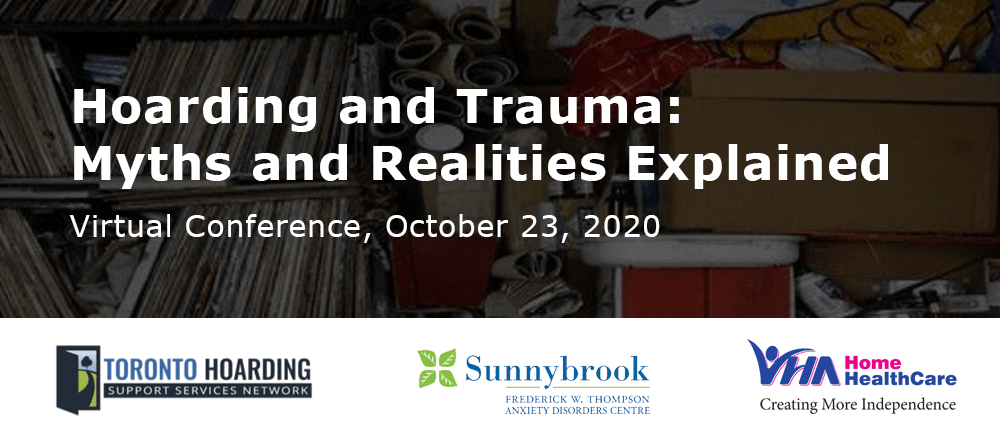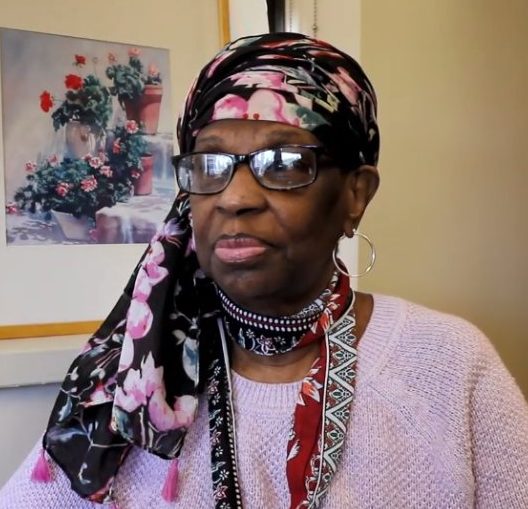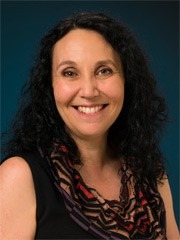Conference Investigates the Complex Relationship Between Hoarding Disorder and Trauma


Client Yvonne Zilber shares her experience with receiving treatment and support for Hoarding Disorder
A surprising 72 per cent of people with hoarding disorder deny being deprived material things during their childhood, but instead experienced a general “lack of warmth” throughout their early experiences. At the Hoarding & Trauma: Myths and Realities Explained conference held virtually on Friday, October 23, over 170 front-line workers, service providers and leading experts explored this and other connections around how traumatic events affect the incidence and severity of hoarding disorder.
The event, organized by Sunnybrook Health Sciences Centre’s Frederick W. Thompson Anxiety Disorders Centre, the Toronto Hoarding Support Services Network and VHA Home HealthCare (VHA), was an opportunity for professionals to connect, share and learn from each other to result in better care for individuals who hoard. This was the 8th conference held by these partners to support hoarding support services in Toronto, and the first one held virtually.
Hoarding disorder, affecting two to six per cent of the population, is the persistent difficulty to part with material possessions regardless of the actual value of these items. Problematic hoarding can lead to significant health and safety issues including debilitating isolation, injury, collapsing floors, infestations, fire hazards and the risk of eviction.
There are many challenges around supporting people with this disorder including the on-average ten year lag from when hoarding behavior becomes problematic to the individual fully recognizing the issue, and that cognitive behavioural treatment, which research consistently shows is the most effective way to treat hoarding, is only an option once the person has insight into their disease. These significant hurdles mean that many people with hoarding disorder go untreated and unsupported for a long period of time. And the COVID-19 pandemic has only furthered this isolation.

Dr. Peggy Richter. Photo courtesy of Sunnybrook Health Sciences Centre
For conference attendees, the focus of the event was to help health professionals understand the challenges that clients with problematic hoarding face and to appreciate how traumatic and difficult events may have impacted their condition.
Following opening remarks by VHA’s CEO Carol Annett, Dr. Peggy Richter, head of the Frederick W. Thompson Anxiety Disorders Centre, offered many insights to help professionals work effectively and compassionately with individuals living with hoarding disorder. Dr. Richter highlighted the importance of verbal and non-verbal communication methods and the preference of a gradual, harm-reduction approach rather than a forced clean-up. Attendees also heard about the lived experience of hoarding from hoarding support services client Yvonne Zilber who shared how decluttering coaching and Cognitive Behavioural Therapy have been very helpful.
Keynote Speaker Dr. Clare Pain, Associate Professor in the Department of Psychiatry at the University of Toronto and Director of the Psychological Trauma Program at Mount Sinai, focused her presentation on the connections between trauma and hoarding disorder. Dr. Pain shared that hoarders more commonly report a series of stressful life experiences rather than isolated traumatic events, and many experience significant adversity in their childhood, such as neglect and other hardships. Dr. Pain revealed that acquiring objects and the increased emotional attachment to these items is often related to the number, range and frequency of traumatic events. Understanding how trauma impacts hoarding behaviour is critical to compassionate treatment and care.
Following these fascinating insights, attendees participated in interactive case study discussions in smaller groups and then shared key recommendations back with the larger group. Participants were also given the opportunity to interact with and learn from a variety of hoarding service providers and health care professionals from across Southern Ontario in a virtual open house.
VHA Home HealthCare is a proud member of the Toronto Hoarding Support Services Network (THSSN), and along with 15 other organizations, they have joined forces to coordinate services and resources to support vulnerable Toronto-area residents with problematic hoarding. Events like this conference help address the challenges people who hoard face when getting support and treatment in our community.
